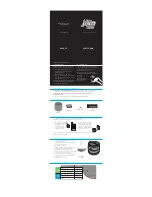
PA55/BT Control Panel
OVERVIEW: CONTROLS & FUNCTIONS BACK PANEL:
INPUT SECTION:
This is where you may plug in microphones, instruments, keyboards, drum machines and other audio devices, adjust the
volume, bass and treble.
1.
MIC Inputs:
These XLR inputs are designed for low-impedance microphones or equipment that has a mic-level, balanced
output (often called a Direct Out). Note: These inputs receive 15-volt phantom power. This is used to provide power to
condenser microphones. Phantom power will not damage any dynamic or non-condenser microphone.
2.
LINE Inputs:
These ¼-inch inputs may be used to connect high-impedance microphones or keyboards, drum machines
and other audio devices.
3.
AUX IN:
Use this stereo input to connect an external audio device such as an MP3, CD player or computer for playback.
Note: Right and Left channels are summed to mono on this input.
4.
Volume:
Use these controls to adjust the volume level of each channel and the relative balance between them.
5.
Low:
Determines the emphasis of bass frequencies. Turning this knob clockwise creates a deeper, warmer tone. If you
need a brighter sound, reduce the bass by turning counterclockwise.
6.
High:
Turned clockwise, this control accents treble frequencies to produce clearer, crisper sound. Turn counterclockwise
to make the sound softer and less bright.
7.
Master Volume:
Controls the overall volume of all channels and input on
SYNC
Note: Does not affect SYNC Output
level.
8.
SYNC IN:
This balanced XLR Jack accepts the
SYNC
output from another PA55/BT using a standard
mic cable. Channels from both PA55/BT's are summed together. Use the channel volume controls to get the mix of the 6
channels (If a channel is not used turn the volume all the way down). MASTER volume controls the loudness of the
mix
through its PA55/BT. It does not affect volume of synced PA55/BT. Note: The shield connection (pin 1) on this jack is
connected to chassis ground. It is not lifted.
9. SYNC OUT:
This balanced XLR Jack accepts the
SYNC
input from another PA55/BT using a standard
mic cable. Channels from both PA55/BT's are summed together. Use the channel volume controls to get the mix of the 6
channels (If a channel is not used turn the volume all the way down). MASTER volume controls the loudness of the mix
through its PA55BT. It does not affect volume of
synced
PA55/BT. This jack may also be used to connect the PA55/BT to a
power amp with a balanced line input. Note: The shield connection (pin 1) on this jack does not connect to chassis ground. It
is lifted.
10. Subwoofer Out:
The PA55/BT subwoofer output jack sends a line level unbalanced low frequency signal crossed over at
150Hz to a PA112-S powered subwoofer. It will also work with any powered subwoofer that accepts a line level input. A
crossover that rolls off the frequencies below 150Hz through the PA55/BT’s speakers is activated when using this jack with
a
standard ¼” mono (tip/Sleeve) SHIELDED instrument cable. When Subwoofer jack is not used, this crossover is bypassed
and PA55/BT speakers are full range. Note: It is recommended to connect subwoofer using a standard ¼” mono (tip/sleeve)
SHIELDED instrument cable because the sleeve connection to ground activates crossover on PA55/BT speakers. When
possible, plug AC cable on PA55/BT and Subwoofer into same outlet or power strip. This will prevent possible ground loop
hum through the system.
11.
Power:
T
his switch activates AC power to the powered PA.
12.
AC Power Cord Receptacle:
Insert the PA55/ BT’ s AC cord firmly into the AC receptacle. Be sure to use the
cable provided with your PA55/BT. The power cord can be removed for storage or replaced if damaged. Note: Replace
the
AC cord if its protective jacket is damaged or ground pin is damaged or removed.
13.
Bluetooth LED(Ava
i
lable with PA55BT model only):
Indicates that a Bluetooth equipped device has successfully paired
with the PA55/BT

























